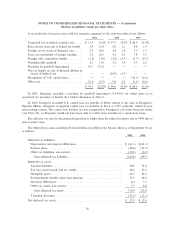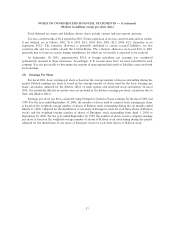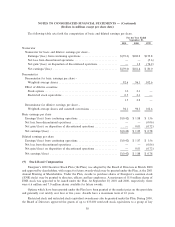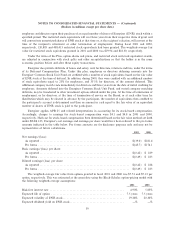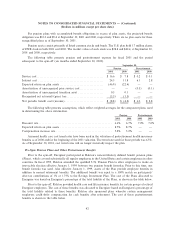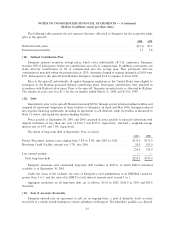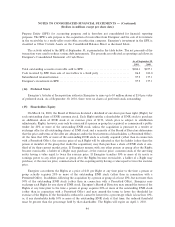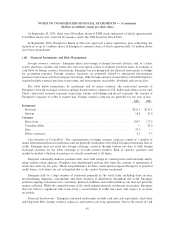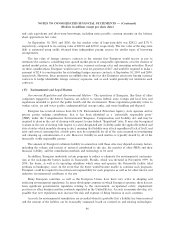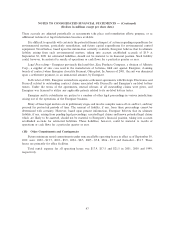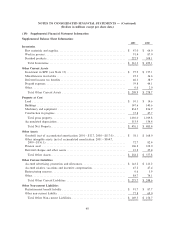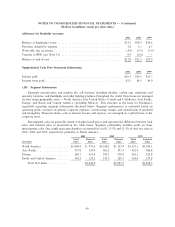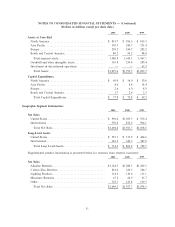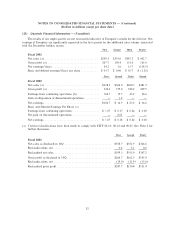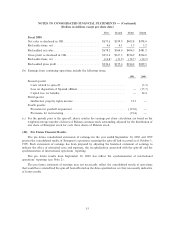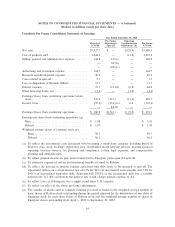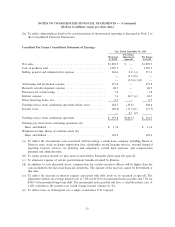Energizer 2001 Annual Report Download - page 49
Download and view the complete annual report
Please find page 49 of the 2001 Energizer annual report below. You can navigate through the pages in the report by either clicking on the pages listed below, or by using the keyword search tool below to find specific information within the annual report.NOTES TO CONSOLIDATED FINANCIAL STATEMENTS Ì (Continued)
(Dollars in millions except per share data)
and cash equivalents and short-term borrowings, including notes payable, carrying amounts on the balance
sheet approximate fair value.
At September 30, 2001 and 2000, the fair market value of long-term debt was $242.2 and $371.9,
respectively, compared to its carrying value of $225.0 and $370.0, respectively. The fair value of the long-term
debt is estimated using yields obtained from independent pricing sources for similar types of borrowing
arrangements.
The fair value of foreign currency contracts is the amount that Energizer would receive or pay to
terminate the contracts, considering Ñrst, quoted market prices of comparable agreements, or in the absence of
quoted market prices, such factors as interest rates, currency exchange rates and remaining maturities. Based
on these considerations, Energizer would receive a total net payment of $6.7 and would be required to make a
payment of $2.4 to counterparties for outstanding foreign currency contracts at September 30, 2001 and 2000,
respectively. However, these payments are unlikely due to the fact that Energizer enters into foreign currency
contracts to hedge identiÑable foreign currency exposures, and as such would generally not terminate such
contracts.
(17) Environmental and Legal Matters
Government Regulation and Environmental Matters Ó The operations of Energizer, like those of other
companies engaged in the battery business, are subject to various federal, state, foreign and local laws and
regulations intended to protect the public health and the environment. These regulations primarily relate to
worker safety, air and water quality, underground fuel storage tanks, and waste handling and disposal.
Energizer has received notices from the U.S. Environmental Protection Agency, state agencies and/or
private parties seeking contribution, that it has been identiÑed as a ""potentially responsible party''
(PRP) under the Comprehensive Environmental Response, Compensation and Liability Act and may be
required to share in the cost of cleanup with respect to nine federal ""Superfund'' sites. It may also be required
to share in the cost of cleanup with respect to a state-designated site. Liability under the applicable federal and
state statutes which mandate cleanup is strict, meaning that liability may attach regardless of lack of fault, and
joint and several, meaning that a liable party may be responsible for all of the costs incurred in investigating
and cleaning up contamination at a site. However, liability in such matters is typically shared by all of the
Ñnancially viable responsible parties.
The amount of Energizer's ultimate liability in connection with those sites may depend on many factors,
including the volume and toxicity of material contributed to the site, the number of other PRPs and their
Ñnancial viability, and the remediation methods and technology to be used.
In addition, Energizer undertook certain programs to reduce or eliminate the environmental contamina-
tion at the rechargeable battery facility in Gainesville, Florida, which was divested in November 1999. In
2001, the buyer, as well as its operating subsidiary which owns and operates the Gainesville facility, Ñled
petitions in bankruptcy court. In the event that the buyer would become unable to continue such programs,
Energizer could be required to bear Ñnancial responsibility for such programs as well as for other known and
unknown environmental conditions at the site.
Many European countries, as well as the European Union, have been very active in adopting and
enforcing environmental regulations. In many developing countries in which Energizer operates, there has not
been signiÑcant governmental regulation relating to the environment, occupational safety, employment
practices or other business matters routinely regulated in the United States. As such economies develop, it is
possible that new regulations may increase the risk and expense of doing business in such countries.
Accruals for environmental remediation are recorded when it is probable that a liability has been incurred
and the amount of the liability can be reasonably estimated, based on current law and existing technologies.
46


